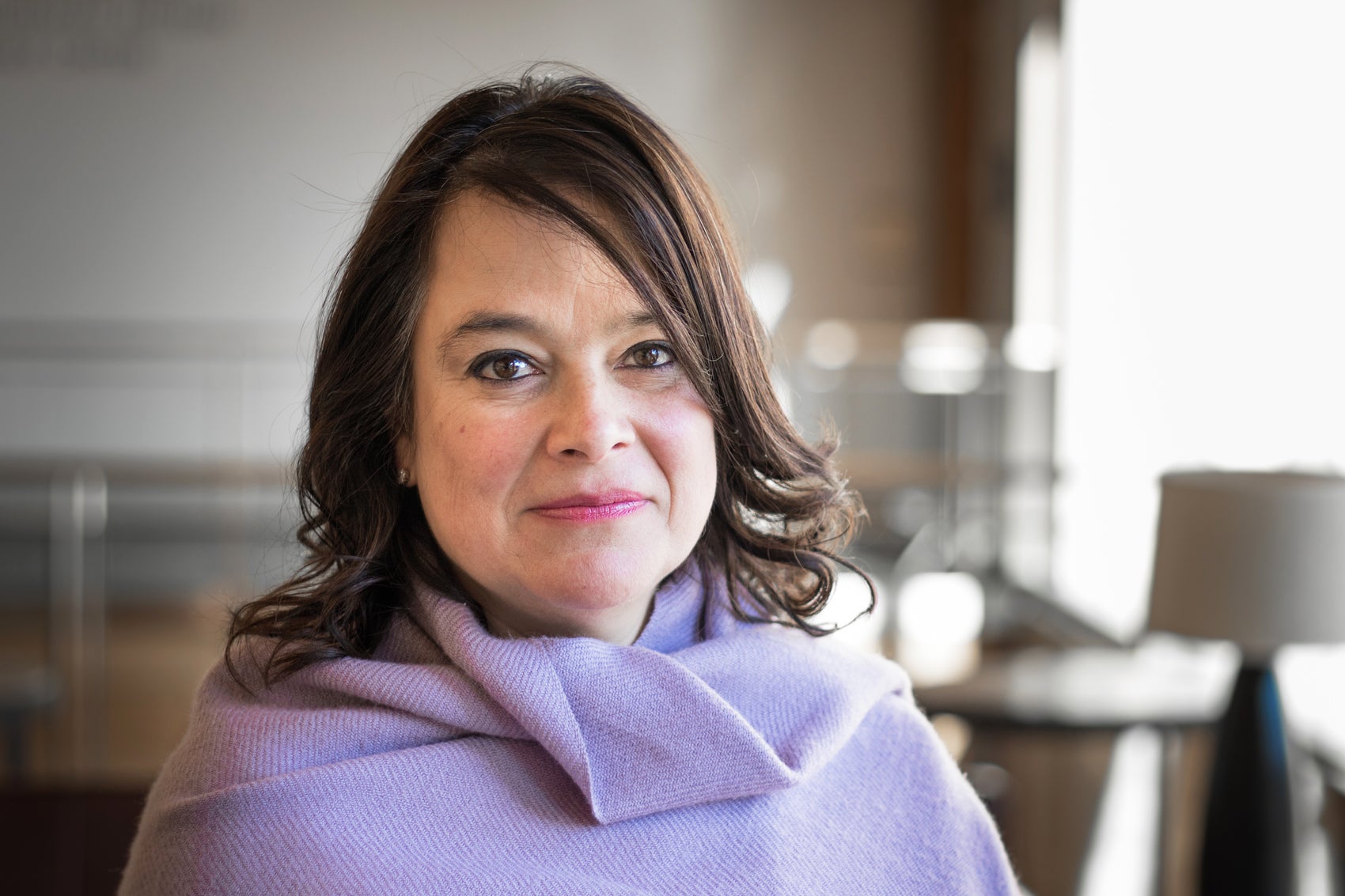Clean white walls frame a large window in the living room of Professor Helena Alviar’s Cambridge apartment. Not a bit of clutter disturbs the room’s simple, almost spartan look. Only the volumes filling a bookcase hint at Alviar’s life and personality. But the place feels familiar to her, suffused with nostalgia’s warmth — she lived in this building from 1996 until 2001, while earning her LL.M. and S.J.D. “Since the day I left, I’ve always wanted to come back,” she says. “There’s something very appealing to me here.”
Alviar returned to Harvard this fall as a visiting researcher at the Institute for Global Law and Policy. She will spend next spring teaching two courses at Harvard Law School as the Robert F. Kennedy Visiting Professor of Latin American Studies. Her time in Cambridge offers an interlude from her work at Universidad de Los Andes in Bogotá, Colombia, where she served as dean of its Law School from 2011 until September of this year. She was both the first full-time professor and the first woman in that role. Along the way, she has also taught in Italy as well as at the University of Pennsylvania and the University of Wisconsin-Madison.
Alviar first came to Harvard Law School on a Fulbright Scholarship in 1996, after having earned her undergraduate law degree at Los Andes. In pursuing advanced legal studies, she was particularly interested in understanding the context — the historical, economic, and sociological circumstances — in which law develops.
Five years later, when Alviar returned to Colombia with her S.J.D. degree from Harvard, it was with a renewed sense of responsibility: “When you study in the U.S. and you go back, you have to intervene in political discussions that are relevant at the time,” she explains. To that end, she authored pieces defending the Constitutional Court of Colombia’s decision to redistribute the country’s resources, challenging economists’ and technocrats’ attacks on the court.
As a member of the Los Andes Law School faculty, she saw scholarly pursuits as an equally important arena to push for social change. “I think that the way you teach law and revamp legal scholarship could really transform the way that people practice law, the way that they see justice, the way that they want to transform the world,” she says. “So in a way, I see academia as activism and social justice.”
Over the years, Alviar has written about property, law and development, social and economic rights, social justice, and feminist theory. Her book, “Derecho, desarrollo y feminismo en América Latina [Law, Development and Feminism in Latin America],” was based on her doctoral thesis, and she considers feminist theory — which she first read at Harvard — “the most intimate side of my academic career.”
Her commitment to combining activism with her work as a legal scholar permeates everything she does. In 2005, Alviar helped co-found Dejusticia, a Colombia-based NGO and progressive intellectual think tank, and continues to sit on the executive board with an eye to influencing policy and pushing forward gender issues. She finds it very gratifying that over the years a steady stream of HLS students have carried out interesting projects during internships at Dejusticia.
When Alviar was appointed dean of Los Andes Law School in 2011, it allowed her to take her commitment to social justice and scholarly excellence to a whole new level. “I’m actually very proud of the way I was a dean,” she says. “I was able to hire professors. I got money for research for my professors. I enabled them to travel to conferences. I strengthened the summer school.”
As part of the ambitious agenda she set for herself as dean, Alviar also worked hard to increase scholarships for needy students, so as to broaden Los Andes’ inclusivity across race, gender and class lines. And she continued to push the boundaries for women, whether in her own work as a principal researcher at Los Andes’ Law and Gender Research Group, or, as dean, supporting No es Normal (It’s Not Normal), a campaign against sexual harassment and discrimination at Los Andes.
Alviar paid particular attention to the administrative staff, 80 percent of whom are women. Not authorized to raise their wages, she realized that she could increase their salaries via promotions and by enabling them to use a university program which partly subsidizes their education. She also created flexible schedules for them. This real-world feminism eased some of the complications facing her fellow working mothers.
Now that she has settled back into her erstwhile Cambridge apartment building, Alviar is savoring both the familiarity of her surroundings as well as the novel aspects of her current sojourn at Harvard — as an established scholar this time instead of a student. As she prepares to teach two courses in the spring — Modernization, Development and Revolution: Legal Experiments in Latin America, a seminar focusing on how legal institutions and discourse have responded to contemporary problems in Latin America, and Contemporary Critical Thinking Perspectives from the Periphery, in which the writings of contemporary legal scholars from the periphery will be studied in juxtaposition with influential theoretical writings of established scholars — Alviar is looking forward to the interaction with her students.
“After all,” she muses, “teaching is not just about teaching, but about the interaction with your students, from whom you always learn a lot. It’s always about the dialogue, and the creating of an academic community.” All things considered, what is so especially appealing to Alviar about being back here is the opportunity to immerse herself again in the intellectually challenging academic community at Harvard Law School.
